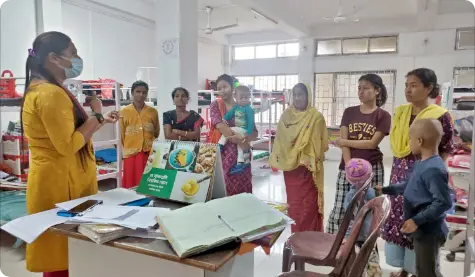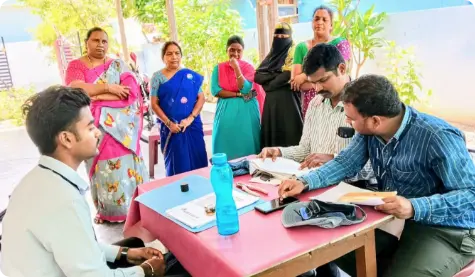
ANNUAL REPORT 2023-24


An ongoing engagement with our stakeholders is important for the Bank to understand matters relevant to them and create sustainable value for all.
The Bank continuously endeavours to understand the concerns and opinions expressed by stakeholders and respond to them promptly. The Bank holds regular interactions with customers, investors, employees, regulators and engages with communities and banking associations to remain informed.
We believe that engaging with our shareholders and investors is important to understand market priorities and drive business outcomes that can lead to sustainable value-creation for all stakeholders.
There is continuous engagement with our investors and shareholders either through the annual general meeting, periodic conference calls, analyst day event, emails or one-to-one interactions. The Bank also has mechanisms to address queries and grievances of our shareholders and investors.
During fiscal 2024, the Bank continued to deliver sustainable return on capital to shareholders. The Investor Relations team provides details on the performance and strategic objectives of the Bank during quarterly results calls and endeavours to enhance disclosures in the investor presentations on an ongoing basis depending on market conditions and investors’ feedback. Continuous engagement is ensured including meetings with the senior management. The team also facilitates engagement with investors on topics like Environmental, Social and Governance to provide insights with regard to the journey on sustainability in the Bank’s own operations and management of climate-related financial risks.
The Bank is committed to contributing towards socio-economic development and, for the larger benefit of the society, is undertaking corporate social responsibility activities across the length and breadth of the country.
The Bank set up its philanthropic arm, ICICI Foundation for Inclusive Growth (ICICI Foundation), in 2008 for addressing critical gaps in socio-economic development, particularly in rural areas in India. Rural development initiatives are also being undertaken directly through the Bank’s efforts in promoting financial inclusion and inclusive growth.
The ICICI Foundation team extensively engages with local authorities and people to understand needs and development gaps. The key asks have been to address the need for health facilities, overcome water shortage and prevent environment degradation.
During fiscal 2024, the Bank fulfilled its obligation of ₹5.17 billion towards CSR activities in compliance with the CSR rules under the Companies Act, 2013. The approach to undertake CSR activities included adopting a holistic approach at micro level to address developmental gaps and design comprehensive solutions underpinned by the objectives of sustainability and scalability. Environment and healthcare were major areas of focus for the Bank’s CSR activities in fiscal 2024.
As a large financial institution, the Bank recognises the importance of engaging with its value chain partners on ESG. The Bank’s supplier code of conduct and also checklists on ESG factors for onboarding of new vendors are providing a basis for engaging with our vendors on these aspects and building awareness on the need for adopting green procurement standards and promoting social factors like human rights, diversity and inclusion.
We are committed to understanding the requirements and expectations of our customers, and continuously engage with them to shape Customer 360º experiences.
We engage through multiple channels like their interaction with our frontline employees, structured surveys for seeking feedback, customer meets organised at business centres and channels available for raising queries and grievances. There are also quarterly interactions organised between customers and the Customer Service Committee of the Board.
The Bank has put in place mechanisms to ensure customer needs are appropriately addressed and right-selling of products and services are ensured. Reiterating the principle of ‘Fair to Customer, Fair to the Bank’ in every communication to employees, the approach is to only offer products that meet requirements of a customer. In the past, the Bank has withdrawn products that could potentially lead to mis-selling and inconvenience the customer. In line with the above principle, the Bank has also moderated prepayment fee for certain products/segments.
The Bank has a dedicated customer service team focussed on improving process efficiency, reducing customer effort and leveraging technology to enhance customer experience and response time. This is accompanied with continuous upskilling and knowledge building of staff. The Bank strongly follows a policy of zero tolerance to unethical conduct by employees.
Being a systemically important bank in India, ensuring resilience and stability is important for the Bank.
Our engagement with the regulators is ongoing, through periodic meetings and other forms of communications like emails, letters, etc. The Bank also participates constructively in policy forums organised by the regulators and also responds to policy-related discussion papers issued by the regulators.
The Bank has a dedicated team for communicating with regulators and responding to their specific requirements in a time bound manner. The Bank has well-defined processes and is leveraging technology to ensure monitoring and compliance to regulatory developments. The Bank has increased focus on building resilience and also participates in initiatives undertaken by the regulator. The Bank undertakes various awareness and training initiatives to enhance Bank’s focus towards customer conduct.
Social issues such as access to healthcare, prevention of environmental degradation, skill development and livelihood opportunities remain critical areas requiring support in India. Creating a thriving society and economy requires significant investments in these areas. The Bank, through its implementing arm, the ICICI Foundation for Inclusive Growth (ICICI Foundation), has focussed on creating a positive impact through its CSR initiatives and is working directly with communities and stakeholders to meaningfully contribute in these areas. The activities are also aligned with the United Nations (UN) Sustainable Development Goals (SDGs).
During fiscal 2024, the Bank’s contribution towards social causes was ₹5.19 billion. The CSR initiatives were mainly in the areas of healthcare and sanitation, environmental and ecological projects, livelihood and social interventions focussed on meeting specific local needs.
In the area of healthcare, support was extended for cancer care, cardiac care, eye care and trauma care by providing equipment, funds for surgeries, undertaking capacity building, organising eye screening camps and support for emergency care.
In the area of environment and ecology, extensive watershed and rainwater harvesting projects were taken up during the year as part of water conservation projects. Till March 31, 2024, total water harvesting potential of about 25.8 billion litres has been created across rural India. The other area of extensive work done is in forest conservation. The initiatives on forest conservation and ecology included ensuring water availability, restoring habitat, enhancing biodiversity, preventing soil erosion, supporting afforestation and livelihood creation, and other green initiatives which included installation of renewable energy capacity for creating grid-free forests and supporting clean energy in villages. These efforts were across 53 forest reserves as on March 31, 2024.

Counselling by a child nutritionist at Cachar Cancer Care Hospital and Research Centre in Silchar, Assam.

Successful rejuvenation of Alkoda Lake in Raichur District, Karnataka.
ICICI Foundation engaged with marginal and landless farmers and provided support for agricultural value chain development, livestock rearing and skill development for livelihood. This effort benefited about 80,000 individuals across various projects in fiscal 2024. As part of social interventions, projects were undertaken based on local needs and enabling community welfare and included activities such as development of infrastructure in remote areas, promotion of financial literacy, and improvement of access to education among marginalised communities.
For more details on ICICI Foundation’s activities, refer to the Bank’s ESG Report for fiscal 2024.

Locals using a footbridge in a village in Raesi District, Jammu constructed through ICICI Foundation’s efforts.
There are specific segments of the rural economy that require a more supportive and sensitive response to their financial requirements and the Bank has taken initiatives to address the needs of such segments. The Self-Help Groups (SHGs) programme is an initiative that has contributed to entrepreneurship among women in the rural areas. A comprehensive suite of banking products, including zero-balance savings account and term loans, for meeting the business requirements of the women of these SHGs is provided. Services are offered at their doorstep, thus saving their time, money and effort to visit the closest business centre.
ICICI Bank has been extending loans/providing financial support to less privileged women of the country through Self Help Groups - Bank Linkage Programme (SHGs-BLP) for over a decade, to give a boost to their entrepreneurial spirit. These initiatives have positively impacted 10.49 million women across the country through approximately 8.9 lakh SHGs loans as on March 31, 2024. Of these, over 4.67 lakh were first-time borrowers, who had not taken a loan from any formal financial institution. These SHGs are engaged in livelihood-generating activities which are helping them scale up their economic enterprises and improve financial security.
During fiscal 2024, the Bank availed USD 100 million from a financial institution for onward lending through its SHGs-BLP that aims to empower less privileged women in India to become self-reliant and to help them expand their businesses and enhance their earning capability.

Members of an SHG in Palakurthy from Jangaon District, Telangana, being informed about SHG loans that they can avail from ICICI Bank.
In addition to direct customers, the Bank reaches out to about 2.2 million customers through microfinance institutions. The Bank also provides lending to Joint Liability Groups (JLGs), which are semi-formal groups from the weaker sections of society, through microfinance companies. These activities are undertaken within the overall framework prescribed by the RBI. The Bank also offers credit-related services to microfinance companies for onward lending to the rural population.
At March 31, 2024, the Bank had over 21.1 million Basic Savings Bank Deposit Accounts (BSBDA), of which around 4.4 million accounts were opened under the Pradhan Mantri Jan Dhan Yojana. The Bank encourages and enables these account holders to transact digitally.
Technology has played a key enabler in fostering financial inclusion. The delivery of financial services in remote unbanked and under-banked areas has been made possible due to digitisation. In fiscal 2023, the Government of India announced the launch of Digital Banking Units (DBU) with the objective of encouraging customers to undertake and experience the benefits of digital transactions. The DBUs are primarily fixed-point business units for delivering digital banking products and services, with most services made available in both self-service and assisted mode. The Bank set up four such DBUs which were launched in October 2022. Key performance parameters of the DBUs during April 2023 - March 2024 were as follows:



Employees are the most important capital for the success of our strategy and growth of the organisation. We believe in providing an inclusive workplace, driven by meritocracy and equal opportunities to all.
How Do We Engage
Engagement with employees is through various platforms including townhall sessions with directors, periodic communication meetings and business centre visits by senior leaders, videos to communicate with employees through the employee app, Universe on the Move, and query raising portal.
Subjects considered important by our employees:
Our Response
In the last two years, the Bank has significantly reorganised its workforce with new roles aligned to market opportunities. Promoting job rotation and encouraging employees to move across roles is helping the Bank in providing career growth to employees.
The Bank believes in giving responsibility to young capable professionals ahead of time and supporting them in their next career move early in their professional journey. Learning and skill development is an important value proposition provided to employees. The focus of skill development initiatives is on digital, functional and behavioural learning. Principles of Diversity, Equity and Inclusion are embedded in HR practices at the Bank. The fair compensation policy aligns rewards with prudent risk taking. Care and well-being of employees is a key focus area and relevant policies and practices have been established in this regard. The Bank has a culture where employees can raise issues freely and can expect their grievances / concerns to be handled in a sensitive manner.